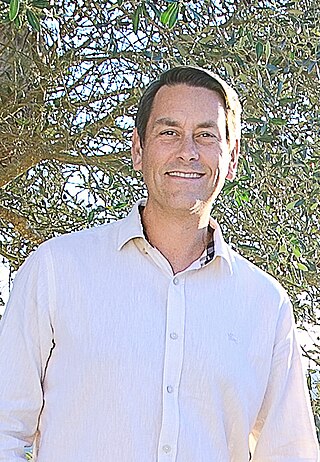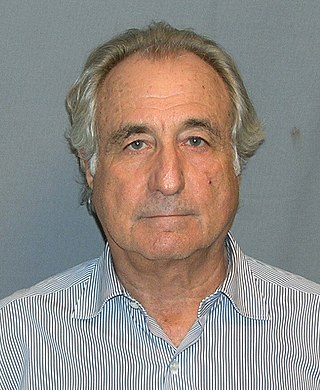Related Research Articles

МММ was a Russian company that perpetrated one of the world's largest Ponzi schemes of all time, in the 1990s. By different estimates from 5 to 10 million people lost their savings. According to contemporary Western press reports, most investors were aware of the fraudulent nature of the scheme, but still hoped to profit from it by withdrawing money before it collapsed.
Affinity fraud is a form of investment fraud in which the fraudster preys upon members of identifiable groups, such as religious or ethnic communities, language minorities, the elderly, or professional groups. The fraudsters who promote affinity scams frequently are – or successfully pretend to be – members of the group. They often enlist respected community or religious leaders from within the group to spread the word about the scheme, by convincing those people that a fraudulent investment is legitimate and worthwhile. Many times, those leaders become unwitting victims of the fraudster's ruse.
Offshore investment is the keeping of money in a jurisdiction other than one's country of residence. Offshore jurisdictions are used to pay less tax in many countries by large and small-scale investors. Poorly regulated offshore domiciles have served historically as havens for tax evasion, money laundering, or to conceal or protect illegally acquired money from law enforcement in the investor's country. However, the modern, well-regulated offshore centres allow legitimate investors to take advantage of higher rates of return or lower rates of tax on that return offered by operating via such domiciles. The advantage to offshore investment is that such operations are both legal and less costly than those offered in the investor's country—or "onshore".
Farouk "Frank" Agrama was an Egyptian-born American film director and producer, writer and businessman. He was the founder and chief executive officer (CEO) of Harmony Gold USA, Inc.

Clayton Morris is an American YouTuber, real estate investor, and former television news anchor. He co-hosts Redacted News on the video platform Rumble and on his eponymous YouTube channel and a podcast on Investing in Real Estate.
Jacob Ezra Merkin is an American investor, hedge fund manager and philanthropist. He had been a fund manager and capital raiser until 2008 when one of the funds in Gabriel Capital LP, his $5 billion group of hedge funds became insolvent because a large portion of its assets was invested with the convicted Ponzi scheme operator Bernard Madoff. The fallout from his investment with Madoff has been extensive. He navigated a series of lawsuits without a finding of fraud or knowledge of the scheme, but agreed to repay any fees earned from the investment in Madoff historically. He had to resign a series of positions including his role as non-executive chairman of GMAC.
Nicholas Cosmo is an American former businessman and white-collar criminal. He was arrested January 26, 2009 on charges of an estimated $370–413 million Ponzi scheme. Cosmo conducted the scheme using his company Agape World Inc. in Hauppauge, New York, which claimed to make its profits via commercial bridge lending. Authorities arrested him in Hicksville, New York.

Frank DiPascali Jr. was an American fraudster and financier who was a key lieutenant of Bernie Madoff for three decades. He referred to himself as the company's "director of options trading" and as "chief financial officer". For a number of years, he played a key part in the daily operation of the Madoff investment scandal, later recounting how he helped manipulate billions of dollars in account statements so clients would believe that they were creating wealth for them.

The Madoff investment scandal was a major case of stock and securities fraud discovered in late 2008. In December of that year, Bernie Madoff, the former Nasdaq chairman and founder of the Wall Street firm Bernard L. Madoff Investment Securities LLC, admitted that the wealth management arm of his business was an elaborate multi-billion-dollar Ponzi scheme.

Steven Jude Hoffenberg was an American businessman and fraudster. He was the founder, CEO, president, and chairman of Towers Financial Corporation, a debt collection agency, which was later discovered to be a Ponzi scheme. In 1993, he rescued the New York Post from bankruptcy, and briefly owned the paper. Towers Financial collapsed in 1993, and in 1995 Hoffenberg pleaded guilty to bilking investors out of $475 million. He was sentenced to 20 years in prison, plus a $1 million fine and $463 million in restitution. The U.S. SEC considered his financial crimes to be "one of the largest Ponzi schemes in history".

Participants in the Madoff investment scandal included employees of Bernard Madoff's investment firm with specific knowledge of the Ponzi scheme, a three-person accounting firm that assembled his reports, and a network of feeder funds that invested their clients' money with Madoff while collecting significant fees. Madoff avoided most direct financial scrutiny by accepting investments only through these feeder funds, while obtaining false auditing statements for his firm. The liquidation trustee of Madoff's firm has implicated managers of the feeder funds for ignoring signs of Madoff's deception.
Kaleil Isaza Tuzman is a former entrepreneur associated with digital media, who spent more than 20 years in that industry before being convicted of multiple counts of fraud in 2017. Tuzman started his career at Goldman Sachs, was co-founder of GovWorks.com, served as President of JumpTV, and then as chief executive officer and chairman of KIT Digital, Inc. On September 7, 2015, he was arrested in Colombia and held in a Bogotá prison until being extradited to the United States to face charges of fraud and market manipulation in connection with the defrauding of investors in KIT Digital and two investment funds. He was convicted on all counts in December 2017.
Claud Roderick "Rick" Koerber is an American convicted felon who was found guilty in federal court of orchestrating and running a $100 million Ponzi scheme, one of the largest in Utah's history. Koerber took in $100 million from 2004 to 2008 by promising his victims returns of 24% to 60% annually, but spent $50 million on Ponzi payments to prior investors, and also bought luxury items to give his scheme an appearance of profitability.

Samuel "Mouli" Cohen is an Israeli-American entrepreneur, venture capitalist, and convicted fraudster who claimed to have held the positions of president, chairman, and CEO of several public and private video game companies which, according to Cohen, "have generated over $3 Billion in shareholder value". The companies Cohen has been involved in since the 1980s include: Playnet Technologies, Voltage Capital, LAMIA, Aristo International and Ecast. In April 2012, Cohen was sentenced to 22 years in federal prison for a conviction on 15 counts of wire fraud, 11 counts of money laundering and three counts of tax evasion. He is currently serving a 22-year prison sentence at Terminal Island Federal Correctional Institution.
Timothy Shawn Durham Sr. is an American former lawyer and businessman convicted in 2012 of the largest corporate fraud ever investigated by the Federal Bureau of Investigation in Indiana. His investment firm Obsidian Enterprises invested in a number of companies, including wireless device company BrightPoint and comedy brand National Lampoon, Inc., where Durham was CEO. In 2012, Durham was sentenced to 50 years in prison in connection with a Ponzi scheme that defrauded 5,400 investors, many of them elderly, of approximately $216 million, according to the U.S. Securities and Exchange Commission.

The Swiss investment bank and financial services company, UBS Group AG, has been at the center of numerous tax evasion and avoidance investigations undertaken by U.S., French, German, Israeli, and Belgian tax authorities as a consequence of their strict banking secrecy practices.
Woodbridge Securities was a $1.2 billion Ponzi scheme run by CEO Robert H. Shapiro.
Kenneth J. Casey was a Novato, California, real estate investor and member of the Marin County Human Rights Commission, charged in 2020 with "operating a massive Ponzi scheme" that defrauded "more than a thousand investors" while "embezzling tens of millions of dollars to personally enrich himself". Companies owned by him were investigated by the U.S. Securities and Exchange Commission (SEC), after attorneys said they had "engaged in serious misconduct over the nearly three decades prior to his death".
Robert Theron Brockman was an American billionaire businessman and once CEO of Ohio-based Reynolds & Reynolds software company.
References
- 1 2 3 4 "Sonny Bloch profile at". Radioyears.com. Retrieved October 17, 2011.
- 1 2 "Sonny Bloch profile". Supersizeyourincome.com. Retrieved October 17, 2011.
- ↑ "Family Search Irwin Harry Bloch". ancestorsfamilysearch.org.
- ↑ "Irwin Harry Sonny Bloch". findagrave.com.
- 1 2 Goldiner, Dave (July 12, 1998). "Sonny Bloch, Radio Host Convicted In Scam, Dies". Articles.nydailynews.com. Archived from the original on November 13, 2011. Retrieved October 17, 2011.
- ↑ "Sonny Bloch's betrayal of trust: rip-off artists exploit legitimate media to build credibility and steal millions". Highbeam.com. Retrieved October 17, 2011.[ dead link ]
- 1 2 3 4 5 6 "Bloch Admits Lying to Investors". Articles.latimes.com. September 19, 1996. Retrieved October 17, 2011.
- 1 2 "A Critical Review of Sonny Bloch". Programcritique.com. August 22, 2007. Retrieved October 17, 2011.
- ↑ "Sonny Bloch Radio Show Host Charged with Fraud". The New York Times . May 26, 1995. Retrieved October 17, 2011.
- ↑ "Exclusive . . . Bloch Captured". Time. May 26, 1995. Archived from the original on October 8, 2010. Retrieved October 17, 2011.
- ↑ "Irwin (Sonny) Bloch, 61, Dies; Bilked Radio Show Listeners". The New York Times . July 12, 1998. Retrieved October 17, 2011.